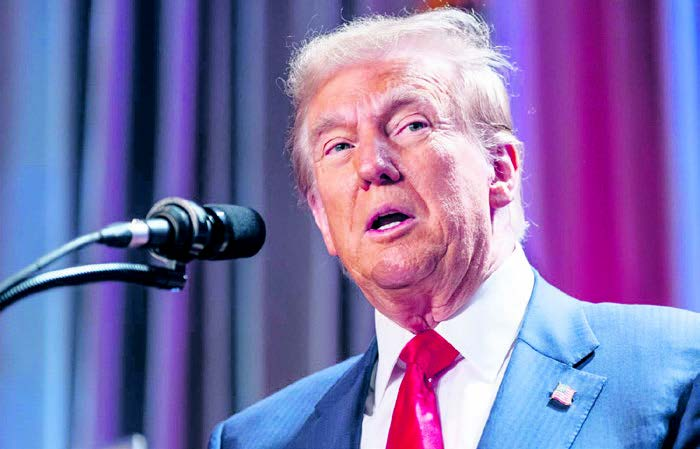
By Charlie Savage
Earlier this week, President-elect Donald Trump advised congressional Republicans to prevent the approval of a bipartisan federal shield bill designed to bolster reporters’ capacity to secure confidential sources, potentially inflicting a critical political setback on the proposal — despite the fact that the Republican-controlled House had previously passed it unanimously.
Trump’s directive significantly reduces the likelihood of the bill — known as the Protect Reporters from Exploitative State Spying Act, or PRESS Act — reaching the Senate for a vote before the current congressional session concludes next month. The delay caused by even a single senator can consume substantial time on the Senate floor that could otherwise be allocated to confirming judges or advancing other legislation considered more urgent.
In a post on his Truth Social platform Wednesday afternoon, Trump issued this command. Referring to a “PBS NewsHour” report about the federal shield legislation, he declared: “REPUBLICANS MUST KILL THIS BILL!”
Trump’s disdain towards mainstream news reporters is evident, often labeling them as “enemies of the people.” During his first term as president, he sought a crackdown on leaks that led to the covert seizure of reporters’ private communications, including those from The New York Times, The Washington Post, and CNN.
Following the revelation of those subpoenas early in the Biden administration, Attorney General Merrick Garland introduced a rule banning prosecutors from employing compulsory legal measures like subpoenas and search warrants to pursue reporters’ information — including requesting third-party companies, such as phone and email services, to provide their data — or compelling them to disclose their sources. However, a future administration could revoke that regulation.
The PRESS Act seeks to enshrine such restrictions into law.
Trevor Timm, the co-founder and executive director of the Freedom of the Press Foundation, expressed hope that Trump might reconsider, arguing that the bill safeguards all journalists, including those primarily addressing conservative audiences.
“The PRESS Act protects conservative and independent journalists just as effectively as it does mainstream media members,” Timm stated. “Democratic administrations have frequently misused their authority to surveil journalists. The bipartisan PRESS Act will curb government overreach and uphold the First Amendment once and for all.”
Timm also highlighted support for the bill among Trump’s Republican allies, including Rep. Jim Jordan from Ohio, chair of the House Judiciary Committee, and Sen. Mike Lee of Utah, a member of the Senate Judiciary Committee.
Additionally, Timm mentioned that Tucker Carlson, a former Fox News host with considerable influence in Trump’s circle, endorsed the PRESS Act in an interview with Catherine Herridge, a former Fox News reporter facing fines for contempt of court for not revealing her sources regarding a scientist investigated by the FBI for connections to the Chinese military. Although the scientist was not charged, she has sued the government for allegedly leaking private information about her during the investigation, which resulted in a subpoena to Herridge.
This legislation has enjoyed widespread bipartisan support, passing the House without opposition in January. However, it has faced delays in the Senate Judiciary Committee.
The committee, led by its chair, Sen. Dick Durbin, D-Ill., has primarily concentrated on confirming as many of President Joe Biden’s judicial nominees as possible before the session concludes and Republicans take control of the chamber next year.
The bill has also encountered skepticism from several Republican senators, complicating efforts to expedite its passage or attach it to other bills, such as the annual defense authorization act.
Congressional staff noted that the bill’s main opponent on the Judiciary Committee has been Sen. Tom Cotton of Arkansas, a staunch Republican who gained notoriety in 2006 as an Army officer in Iraq by criticizing the Times for publishing an investigative report on a counterterrorism financing initiative. Another Republican committee member, Sen. John Cornyn of Texas, has also reportedly expressed some reservations.
Trump did not provide an explanation for his sudden opposition to the PRESS Act, but some of his allies have advocated for diminishing protections for press freedoms.
For instance, Project 2025, a collective of conservative think tanks that formulated a comprehensive governing plan for Trump before his election victory, included in the Justice Department section of its Mandate for Leadership that a second Trump administration should reverse the Garland rule.
Kash Patel, a Trump confidant, also indicated a desire to prosecute journalists in a December podcast hosted by Steve Bannon, Trump’s former strategist.
“We will seek out the conspirators, not just from the government but also in the media,” Patel stated last year. “Yes, we’re going to target the media individuals who have lied about American citizens, who assisted Joe Biden in rigging presidential elections — we’ll come for you. Whether it be criminally or civilly, we’ll sort that out.” He continued: “We aim to utilize the Constitution to prosecute them for crimes they have always accused us of committing but have never done.”
